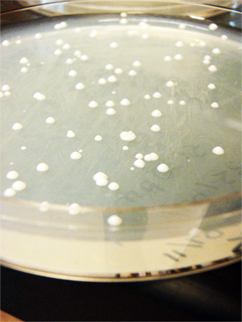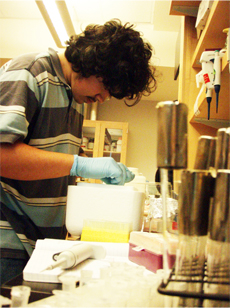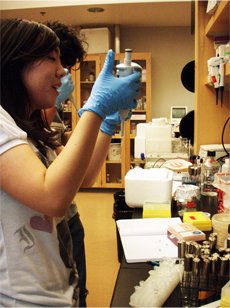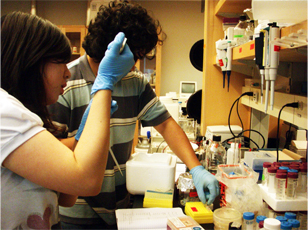Team:British Columbia/Notebook/Week 8
From 2011.igem.org

 |
 |
 |
 |
 |
Contents |
July 25 2011
On July 25th, Gurpal performed a yeast transformation. He transformed his purified pBS and pKS into 2 separate wildtype yeasts. He followed a protocol, left the cells to incubate at 30 degrees Celsius at 3:10pm, heat shocked them for 20 minutes at 42 degrees Celsius and then plated them at 5:30pm. The plates were marked with URA so that the plasmids could grow on them. Then, they were incubated in a 30 degree Celsius incubator.
beta-pinene
- cPCR yeast plasmids and gel verified the products.
- Gel verification showed bands: ligations successful!
July 26 2011
beta-pinene
- Biobrick assembly
- Restriction digested and ligated synthase and psb1C3
- Set up ON culture for yeast plasmids
Marianne and Jacob are putting their parts in the biobricks plasmids!
Alpha- Pinene
July 27 2011
On July 27th, Alina observed the cells and noted that the transformation was a success.
beta-pinene
- Transformed ligations
- Miniprepped yeast plasmids
- Yeast transformation of SND and SDL into wildtype yeast, pKS yeast, pBS yeast
July 28 2011
beta-pinene
- Biobrick ligations
July 29 2011
beta-pinene
- Biobrick transformation
July 30 2011
Track: Alpha-pinene synthase
Joe finally received his primers for PCR amplification of his SDM-alpha pinene synthase necessary for the ligation into yeast and biobrick plasmids. He did a PCR using these primers. However, no PCR products were seen after gel verification. The annealing temperature may have been too low at 55 degrees Celsius. Therefore, he needs to increase the annealing temperature to 60-72 degrees Celsius, the optimal temperature for Phusion Hot Start Polymerase.
 "
"


















